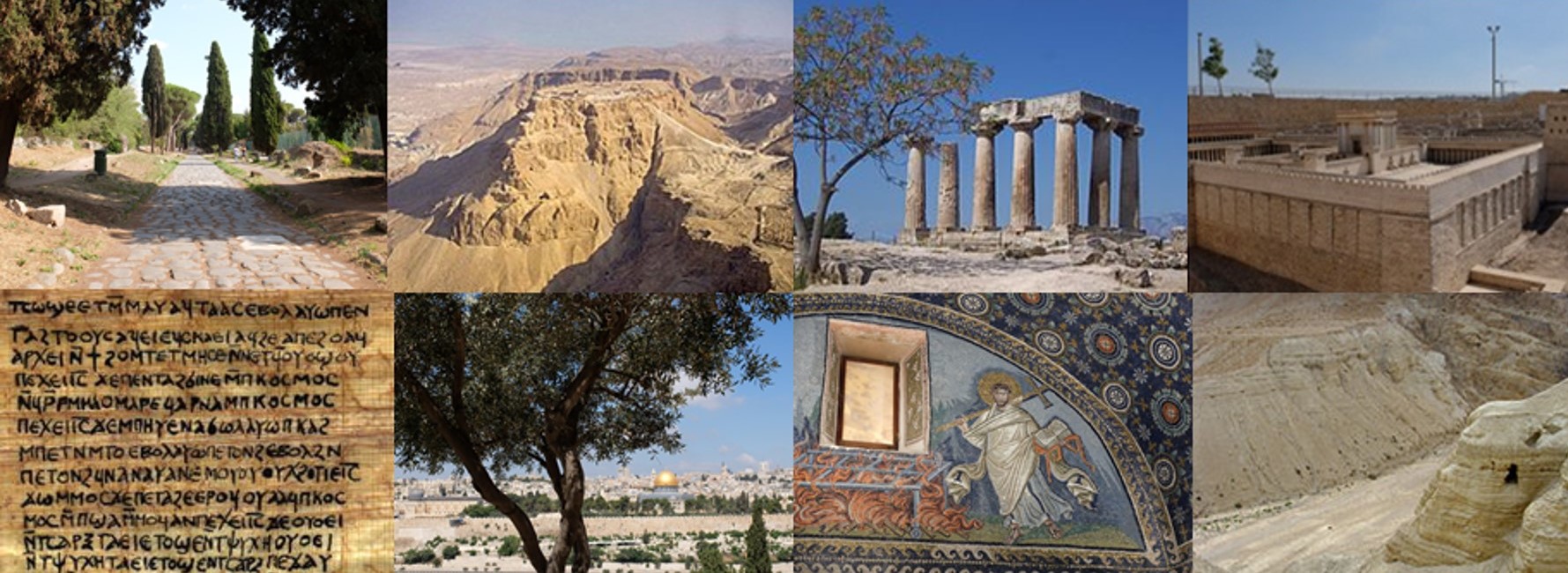Chairs: Elizabeth Corsar and Andy Byers
Session 1
Invited Paper: Julia Lindenlaub, Cambridge University Press, ‘John the Evangelist in Medieval Gospel Books: Apocryphal Traditions of Gospel Composition’
While the figure of the Johannine evangelist has captured imaginations throughout history, this paper assesses the reception of this legendary disciple as transmitted in medieval gospel books, focusing on traditions concerning the gospel’s composition found in apocryphal acts of the apostles and hagiography. The centrepiece of this paper is thus the Memorial of John (BHG 919fb) preface to the Gospel of John (Chicago, University of Chicago, MS 727 [Goodspeed], GA 2266), which reimagines the dictation of the Gospel of John by the evangelist to his disciple Prochorus amid thunderous revelation on a mountain in Patmos. This tradition reflects both the Acts of John by Prochorus and an eleventh-century hagiographic manuscript, Commentary on John by Pseudo-Symeon Metaphrastes (London, British Library, Add. 11870), which features an artistic representation of this same scene. Using these examples, this paper aims to illustrate the continuity of traditions concerning John the Evangelist in apocryphal acts and hagiography, as both can be seen reflected in the Gospel of John’s own textual transmission.
Respondent: Sarah Parkhouse (University of Manchester)
Session 2: Review panel of David Ford, The Gospel of John: A Theological Commentary (Baker Academic, 2021)
This is a joint session with the New Testament and Christian Theology Seminar
Panellists: Richard Bauckham, Andrew Lincoln, and Catrin Williams
Session 3
Emma Swai, Liverpool Hope University, ‘The Metanarrative of Disability in John 5.1-15’
Within Johannine texts impairment carries associated meanings, to the point that a narrative figure is reduced to the impairment, rather than having an independent and/or complex identity. A metanarrative of disability exists, in terms of assuming attitudes, capabilities or attributes relate to particular impairments, within these texts, particularly in the case of the Johannine Gospel; consequently, this paper will use David Bolt’s methodology, that of focusing on a particular impairment to explore the presence and function of a metanarrative of disability, as an interdisciplinary starting point from which to examine how the assumption of passivity and lethargy operates throughout references to paralysis in John 5.1-15. The person with impaired mobility is indeed ‘a pawn in a normate narrative about Jesus’ (Clark-Soles, 2017), but it is one thing to comment on narrative prosthesis and another to attribute iniquity, or in some cases even malice, to their reported responses to Jesus, or purported lack of. By closely examining how the narrative overrides the individual’s identity, it will be shown that agency is not necessarily erased by the text, more by interpretations invoking assumptions associated with paralysis, and that John 5.1-15 is, albeit potentially inadvertently, as much a social commentary as a narrative about Jesus. This paper will show that impaired mobility, as a narrative tool, promotes Jesus’ authority and identity, but it also concurrently challenges the assumptions made by a metanarrative of paralysis, a fact often overlooked by interpretations of the text which are focused on the identity of Jesus.
Eric Foster-Whiddon, University of St Andrews,, ‘Are We Missing Signals? How An Ancient Critic Reads John’s Prologue’
In the ongoing genre debate, the Gospel of John is typically categorized as Greco-Roman biography alongside the synoptics. When read through this lens, the prologue is sometimes seen as an anomaly or a redactional addition which contributes little to the consideration of the narrative’s genre. This approach emphasizes John’s similarities with ancient biographies while obfuscating the literary nuances which invite the reader to approach its story in another way. This paper applies the methodology of Demetrius’ On Style to John’s prologue to demonstrate its function as a signal of literary grandeur. According to Demetrius’ definition of the grand style of prose, five elements of literary grandeur are present in as many verses in the opening of John’s gospel. These elements signal the reader to expect the following narrative to be elevated literature according to ancient critical standards. Conditioned by the Demetrian approach, this paper calls for a reading of the Gospel of John through a lens which sees its peculiarities as indicative of something other than βίος.
Axolile Qina, University of Edinburgh ‘Jesus’ Death and Resurrection in the Gospel of John: A Creational interpretation for Xhosa Christians dilemma with Animal Sacrifices today’
Xhosa Christians have a dilemma to either continue or abandon the practice of animal sacrifice. As early as 1856, Xhosa prophets incorporated Christian resurrection ideas into their cultural-religious views of creational restoration, arguing that if Xhosas ritually sacrificed all their cattle, their ancestors could rise again (resurrection) to help them fight the British Colonial threat and, eventually, restore creation. In John’s Gospel, Jesus’ death on the cross is a Passover sacrifice that removes the world’s sin (cf. Jn. 1.29, 19.14, 19.28-30, & 19.36). Jesus’ resurrection allows for the institution of the Spirit (cf. Jn. 16.7), which is part of a cosmic and creational event that allows believers to be ‘born of God’ (cf. Jn. 1. 12-13). This paper contends that the Jesus’ sacrificial death is part of a cosmic event, along with his resurrection and ascension, which institutes a new creation that transforms the identity of those who believe. In situating this reading of John in the cultural-religious context of Xhosas, a creational interpretation is developed to assist Xhosa Christians dilemma with animal sacrifices today.

